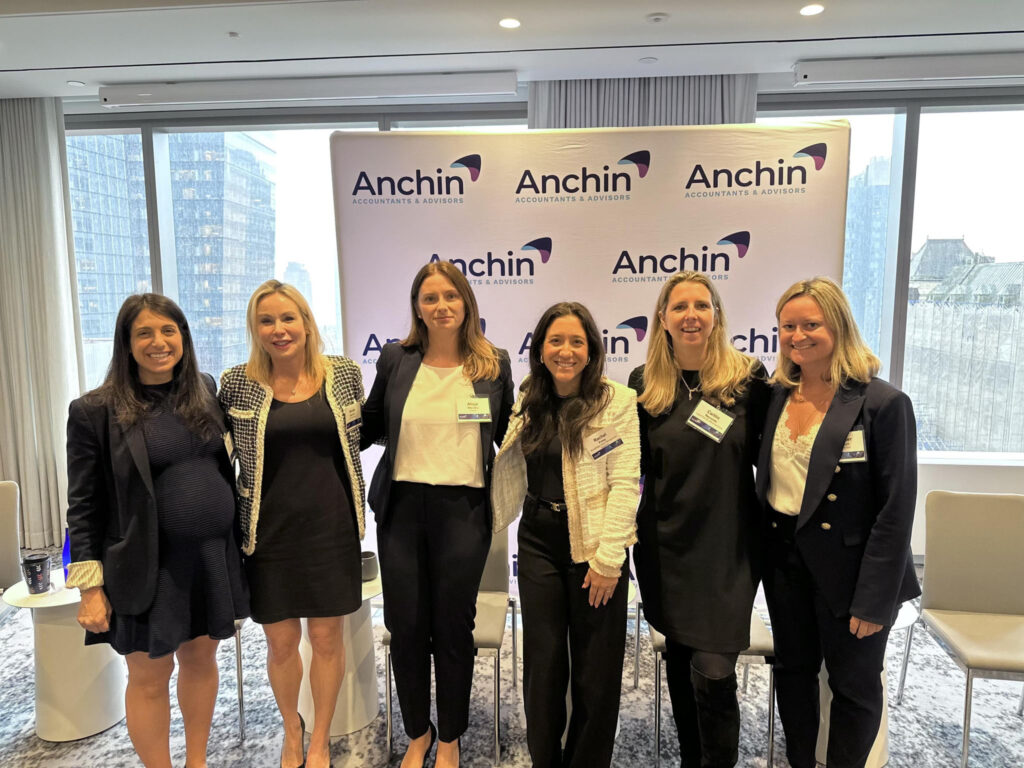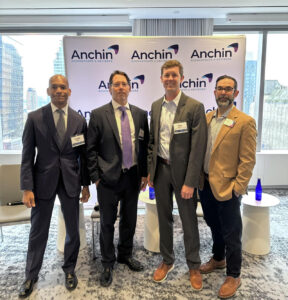Articles & Alerts
Navigating Change: Key Takeaways from Anchin’s 2025 Financial Services Forum
|
Three critical discussions deliver insights on valuation, regulation, and tax strategy for fund managers and financial professionals in 2025 and beyond *** At a time when the financial services industry is facing heightened scrutiny, complex global shifts, and a rapidly evolving regulatory landscape, Anchin convened a trio of expert-led panels to guide industry leaders through what’s ahead. The sessions, featuring senior voices from investment firms, law, tax, valuation, and operations, offered forward-looking analysis and practical recommendations for navigating uncertainty. Spanning topics from liquidity management to portfolio valuation and tax reforms, the panels were designed to help asset managers, CFOs, fund administrators, and investors prepare for a future marked by both risk and opportunity. Below are the most salient takeaways across the three sessions: |
|
|
Moderated by Alicja Mierzwa, Director at Anchin, the “Regulatory Updates and Changes” panel brought together an all-women lineup of senior leaders shaping financial services’ future. Panelists included Nicole Belmont, Managing Director at Far Hills Group; Julia Dworkin, Managing Director & Co-Head of Capital Introductions at Jefferies; Rachel Puleo, Global Head of Product at Broadridge Asset Management Solutions; Caitlin Reynolds, Managing Director & Co-Head of Lazard Family Office Services; and Heather N. Wyckoff, Partner at Alston & Bird. Their respective insights painted a clear picture: resilience is no longer optional—it’s foundational.
Liquidity remains a focal point, particularly for alternative investment vehicles dealing with long-duration or illiquid holdings. Post-2008 reforms have introduced tools like gates and redemption throttles. Still, the panel emphasized newer strategies such as GP-led secondaries and continuation vehicles to deliver optionality and maintain value. Crucially, the Limited Partner Advisory Committee (LPAC) role is evolving. Firms are empowering LPACs with greater advisory and consent rights, ensuring a stronger governance framework when executing complex transactions. Independent valuations are essential, particularly when pricing non-liquid assets or extending fund lifespans. On the regulatory front, the panel spotlighted the Digital Operational Resilience Act (DORA)—a sweeping European framework that mandates financial firms manage ICT (Information and Communications Technology) risk across their full supply chain, including vendors and custodians. Compliance with DORA, which carries financial and criminal penalties for failures, signals a new standard in digital risk accountability. Across jurisdictions, outsourcing, legal coordination, and operational clarity are becoming competitive differentiators. Firms with cross-border activity must invest in diverse counsel and adapt to a fragmented regulatory environment. In a climate defined by uncertainty, collaboration, flexibility, and transparency will determine who stays ahead. |
|
|
Moderated by David Horton, Partner and Assurance Leader of Anchin’s Financial Services Group, the “Dissecting Portfolio Valuation” panel featured a trio of valuation experts offering grounded insight into the complexities of private market investing. Panelists included Damien Hughes, Director of Valuation Services at Anchin; Ryan MacLean, Managing Director at Valuation Research Corporation; and Peter Wollmeringer of Rockport Investment Partners. Together, they explored the tension between theoretical models and real-world dynamics when valuing assets across market cycles.
Privately-held investments—especially in venture and growth equity—pose valuation challenges given their limited market visibility and liquidity events often based on entity-specific factors and broader industry dynamics. The panel advocated for a multi-faceted approach with respect to estimating the value of privately-held investments, which typically consists of blending comparable market transactions or comparable companies, technical indicators, and company fundamentals. The relevance of public market trends depends heavily on an investment’s maturity. The valuation of early-stage entities, often driven by milestones, may diverge from public benchmarks, whereas entities nearing a liquidity event are often more sensitive to macroeconomic conditions. As such, fund managers need articulated valuation policies that explain the relative weighting of each factor, especially in volatile markets. Additionally, precedent transactions, including recent financing rounds, are typically a reliable starting point for a valuation analysis. However, it is critical to gain a proper understanding of the facts and circumstances of the transaction details as part of the valuation process. The panel emphasized adjusting for related-party dynamics, distressed pricing, or strategic motivations behind transactions. As the time between a precedent transaction and a measurement date increases, the panel highlighted that more weighting is typically placed on traditional valuation approaches (i.e., income or market approaches) to reflect an entity’s operating performance and changes in market conditions. Another key theme of the discussion revolved around the manner in which investors should consider dynamics of an entity’s capital structure within a valuation analysis. The panel highlighted that security-specific features including dividend rights, seniority rights, liquidation preferences, and conversion and participation features may have a significant impact on the value of investors’ holdings within an entity with a complex capital structure. Further, the panel noted that investor-specific parameters including exit timing and the size of the ownership interest (e.g., controlling versus minority) should be considered in conjunction with the security-specific features. The panel noted that all of these items should be considered as part of an analysis whether the valuation is for tax, financial reporting or internal-planning purposes. Ultimately, a valuation analysis is not just a technical task — it’s a governance issue. A quality valuation analysis coupled with a strong valuation policy and supporting documentation help to ensure that fund managers are able to align the audit process with investor expectations, while enhancing credibility. |
|
|
Moderated by E. George Teixeira, Partner and Practice Leader of Anchin’s Financial Services Group, the “Tax Trends Update” panel convened leading tax authorities to decode the shifting regulatory landscape. Panelists included William Defabbia, Managing Director at GlobeTax; Michele Itri, Partner and Co-Chair of the Investment Management Practice at Tannenbaum Helpern Syracuse & Hirschtritt; and Timothy P. Noonan, Partner at Hodgson Russ LLP. Together, they offered a comprehensive view of federal, state, and international tax developments reshaping financial services professionals’ strategies.
The panel began with the impending expiration of the Tax Cuts and Jobs Act (TCJA) provisions in 2025. This development will materially affect individual rates, pass-through deductions, and estate planning. The Trump administration’s “Big Beautiful Bill” has proposed sweeping tax changes, including extending most provisions of the TCJA, while making some provisions permanent, and also calling for an exemption from federal tax (offset by tariffs) for those earning under $200,000. Navigating these changes will require real-time scenario planning. Panelists stressed that future legislation will likely hinge on the Senate’s budget reconciliation process, with limits on deficit increases beyond a 10-year window. The takeaway: don’t wait for clarity—prepare now. Carried interest taxation emerged as another flashpoint. Several proposals aim to treat it as ordinary income, applying both income and self-employment taxes. This could open the door for high-tax states, like New York and California, to source and tax carried interest more aggressively, particularly if the federal classification shifts from capital gain to compensation. The conversation also examined pass-through entity taxes (PTETs) as a workaround to the $10,000 SALT deduction cap. While these programs have gained popularity, they carry potential audit risks and require thoughtful implementation. International tax changes are compounding complexity. Countries such as Denmark, Germany, and Italy are tightening tax reclaim processes, demanding additional documentation such as holding periods, residency proof, and beneficiary-level data. Relief at source is possible, but only if fund structures are proactively managed and custodians are well-informed. One notable update involved Cayman-domiciled entities, which recently became eligible for withholding tax reclaims in select jurisdictions—a potential win for fund administrators and LPs. The session closed with a discussion on self-employment tax rules, highlighting a 2023 tax court decision that narrows eligibility for exemptions under IRC Section 1402. Active partners in private equity or fund vehicles may no longer qualify, exposing many firms to new risks unless structures are reassessed. |
|
|
Final Thoughts: Readiness is the New EdgeAcross all three panels, a consistent theme emerged: the financial services landscape is growing more interconnected, regulated, and high stakes. Whether through valuation standards, operational resilience, or tax strategy, firms must document clearly, govern transparently, and plan with flexibility. For industry professionals, these sessions served as a call to action. Rather than wait for finalized rules or market stability, the most successful firms will embrace uncertainty with rigor, insight, and cross-functional coordination. As we move into the second half of 2025, the industry is no longer preparing for change—it’s actively navigating it. Firms that invest in adaptability, transparency, and specialized expertise will be best positioned to lead through whatever comes next. And in times like these, the value of a knowledgeable advisory partner cannot be overstated. Navigating today’s complexity demands more than compliance—it requires collaboration, strategic thinking, and a partner who understands how all the pieces fit together. For more information, please contact Alicja Mierzwa, David Horton, George Teixeira, or your Anchin Relationship Partner. |



